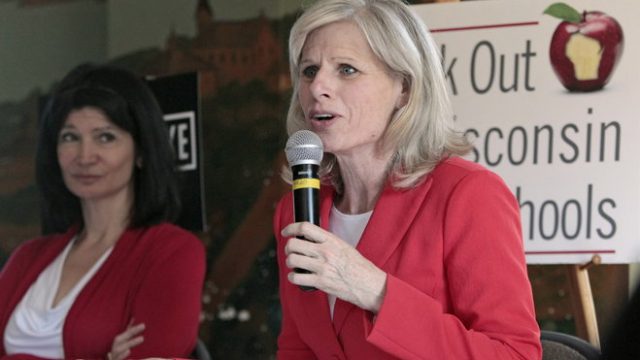Burke not entirely accurate with minimum wage statement, Culver’s spokesman says

COME AGAIN?: A spokesman for the Wisconsin-based Culver’s restaurant chain says gubernatorial candidate Mary Burke did not tell the whole story when referencing the company in a public debate last week with Gov. Scott Walker.
By Adam Tobias | Wisconsin Reporter
MADISON, Wis. — Democratic gubernatorial candidate Mary Burke wasn’t entirely accurate in her first debate with Republican Gov. Scott Walker last week when she claimed a co-founder of the restaurant chain favored a statewide minimum wage increase for adults, says a spokesman for Culver’s CEO Craig Culver.
Paul Pitas, director of public relations and communications for the company, told Wisconsin Reporter on Tuesday that Burke failed to acknowledge eight Culver’s restaurants employ a three-tiered wage system when she referenced a Wisconsin Public Radio interview with Culver that aired in February.
“Unless you mentioned three-tiered, people don’t get that,” said Pitas, who has received several calls from concerned customers since Burke made the claim. “They miss it.”
In the five Wisconsin stores owned and operated by the Culver family, 14- and 15-year olds start at the federal minimum wage of $7.25 an hour. The starting hourly wage for 16- to 18-year-olds is $8.25, and adults are paid a minimum wage of $10, according to Pitas.
But Pitas says the general managers at those five locations have the flexibility to start employees at a higher pay rate, based on their experience and skill set.
When Culver gives his views on minimum wage increases, he is only speaking for himself and his eight family owned restaurants, Pitas told Wisconsin Reporter. The franchisees of the 500 other Culver’s locations in the country have control over their own pay scales, according to Pitas.
“This is Craig Culver’s personal opinion,” Pitas said. “This is not a corporate position.”
The Culver’s corporation as a whole does not have a public stance on minimum wage.
“We try to stick to food as much as we possibly can,” Pitas said.
Burke referred to Culver at Friday’s debate when asked to give her viewpoint on a proposed statewide minimum wage of $10 per hour.
“Business person Craig Culver, great homegrown Culver’s restaurants — I think we all are very proud of that — he supports increasing that minimum wage for working adults,” Burke said.
Burke said she would look to implement a minimum wage hike if elected governor because it would result in more money going into the economy and less dependence on government assistance.
But the Wisconsin Restaurant Association shot back Tuesday, claiming in a news release Wisconsin’s economy is not at a point where it could adequately handle a minimum wage increase.
“Wisconsin’s economy is improving, slowly but surely. It is not, however, back to a level of growth where a minimum wage hike won’t cause businesses to go under and jobs to be lost,” said Ed Lump, president of the Wisconsin Restaurant Association. “Raising the minimum wage at this time is not going to be good for Wisconsin’s economy.”
Byron Schlomach, director of the Center for Economic Prosperity at the Arizona-based Goldwater Institute, told Wisconsin Reporter a tiered minimum wage system would be devastating for unskilled adults because companies would choose to hire teenagers almost every time.
“It would make it so easy to substitute in the unskilled teenagers,” Schlomach said.
Those losses in jobs for adults could negate any savings in government assistance, according to Schlomach.
But Schlomach admits it’s hard to show how the minimum wage affects the economy because the pay hikes, typically, are incremental. Increases in the minimum wage may not result in mass layoffs, but Schlomach says companies will look for other ways to cut costs, including fewer hours and a reduction in benefits and overtime.
“People don’t realize that just because it’s difficult to identify an uptick in unemployment immediately after an increase in the minimum wage, it doesn’t mean that businesses aren’t reacting and taking steps to reduce their costs,” Schlomach said. “And that generally is going to hurt labor because that’s where the increase in cost is.”
The Burke campaign did not return Wisconsin Reporter’s requests for an interview.







